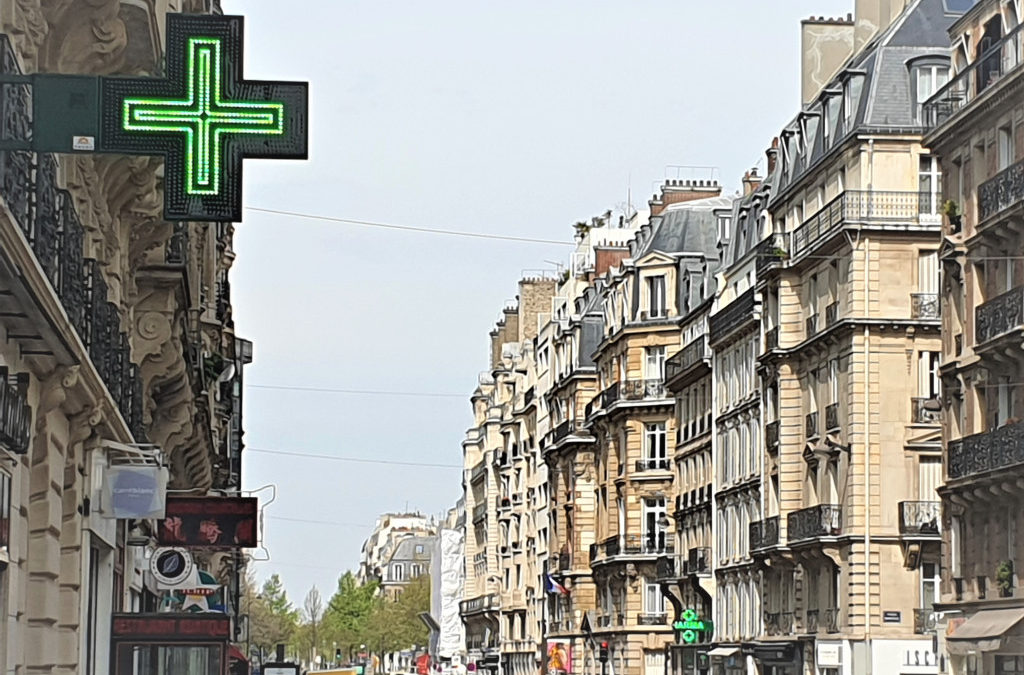By Anne Swardson
The government of France has recruited an unusual ally in its fight against coronavirus. More than 21,000 of them, in fact.
I’m talking about pharmacies. I’d be surprised if there is another country where they play such a key role in everyday life. As my friend and France expert Francie Seder puts it, “A pharmacist often replaces a doctor in France. The pharmacy is a kind of agora overseen by an authority figure that one trusts.”
These privately owned but heavily regulated stores are one of the most trusted institutions in the country – 91% of French people have confidence in their pharmacist, as of 2019.
You can go to your neighborhood pharmacy – you can’t miss those green blinking crosses—with a huge red rash on your face and come away with just the right over-the-counter medicine. You can ask the pharmacienne about your child’s fever and get a recommendation about whether a doctor’s visit is needed or not. When these professionals fill your prescription, they explain exactly how to take or even how to mix the medicine. In English, if necessary.
Pharmacies will dispose of any expired or unwanted prescription meds, no questions asked. Pharmacists, who study for six years after high school, are even trained to recognize which of France’s 35,000 mushroom varieties are poisonous. (The recommendation is to try this only in rural regions where they do a lot of that.)
In theory, there’s one in every town and village, no matter how small the population. I saw at least 12 in a recent run around my Paris neighborhood, while obeying the rule about staying within a kilometer of home. Some were on the same street.

Now, the government is counting on them to educate, warn and supply the public during the coronavirus pandemic. And, in theory, to sell the hand sanitizer, masks, thermometers and other equipment needed to cope with the crisis.
The educating part seems to have gone all right. One pharmacist representative told Le Parisien newspaper that he and his counterparts had responded to thousands of questions since the epidemic began, from how long the virus lasts on surfaces to whether that cough they have is COVID-19.
The supply part, much less so. The government is still failing to make sure pharmacies have the needed items. Occasional price-gouging has ensued: One tried to charge a medical professional I know €3.50 ($3.80) per pair for a box of medical gloves – 100 times the usual price. Hand sanitizer and masks were simply not to be had.

Of the four pharmacies between my apartment and the place de l’Etoile, none had masks, or they could only sell them to health workers. Two didn’t have hand sanitizer.
“The government doesn’t realize what’s happening,” said a pharmacist operating near the Arc de Triomphe. “There’s reality, and there’s what they say on TV. People give us a hard time because the TV says we have masks. But we can’t get them. Maybe they’ll notice when we close.”
Another store didn’t post what products they had or didn’t have, saying they were worried about getting burglarized. A third stationed a security guard outside, though he seemed mostly to be making sure that no more than two people were inside at a time.

The owner of a pharmacy in my neighborhood went on and on about the ridiculous things the authorities had done. First, she was told she couldn’t sell extra-protective masks and an order she had made for them was requisitioned for hospitals. Four days later, she was told she could sell them, so she had to re-order. The price at which she was allowed to sell hand sanitizer was below her cost. Not to mention the fact that she was required to stay open, as an essential industry, yet until recently hadn’t been allowed to buy the kind of masks she needed to protect her staff.
“C’est n’importe quoi!” she said of the government. It’s one of the worst things you can utter: It makes no sense.
But she had plenty of hand sanitizer.

Since last month, pharmacists have been given another essential role: They are reporting centers for domestic abuse, reported cases of which have risen enormously during France’s 23-day lockdown. A victim can arrive at a pharmacy, give her details confidentially and then wait there until authorities arrive. There’s even a code word – Mask 19 – if discretion is needed.
Each pharmacy is supposed to carry a sign explaining that they offer help.

In none of the 16 or so pharmacies I passed or entered in the last couple of days did I see it posted in the window.

Trackbacks/Pingbacks